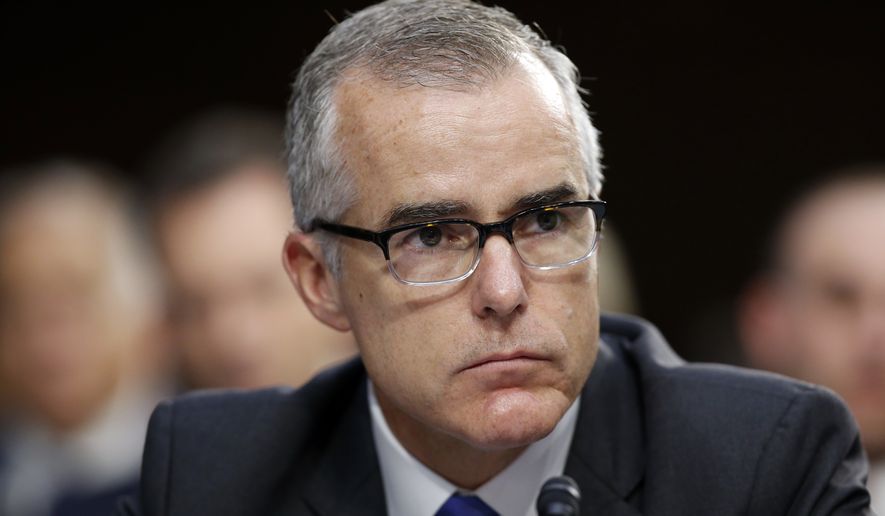A legal watchdog filed a bar grievance against former FBI Deputy Director Andrew McCabe on Wednesday while conservative members of Congress, accusing him of lying under oath, referred him to the Justice Department for criminal charges.
The calls for discipline came just days after an inspector general’s report laid out the case against Mr. McCabe, saying he misled his former boss, then-FBI Director James B. Comey, as well as FBI and inspector general investigators over a media leak he orchestrated during the 2016 presidential election campaign.
Mr. McCabe was fired over the accusations last month, just days shy of his retirement.
But Wednesday’s moves suggest he could face more consequences.
The watchdog Transparency Project filed a bar grievance in Pennsylvania, where Mr. McCabe has been licensed to practice law, demanding an investigation. Although Mr. McCabe’s bar membership has apparently lapsed, it could be reinstated, and Transparency Project founder Ty Clevenger said he wants to make sure that doesn’t happen.
“Bureaucrats like Andrew McCabe have assumed — for good reason — that they were above the law. If we don’t turn that around quickly, we’re going to degenerate into a banana republic,” Mr. Clevenger said. “The Transparency Project intends to expose the double standards for people in power, including federal judges, then work to hold them accountable.”
Meanwhile, 11 conservative members of Congress sent a letter to Attorney General Jeff Sessions asking for Mr. McCabe and a number of other top officials under President Obama to face a criminal investigation on a number of fronts.
They, too, cited the inspector general’s findings as reason to look at criminal charges for Mr. McCabe.
The inspector general said Mr. McCabe lacked candor in several investigations into a leak made to The Wall Street Journal in August 2016. According to an extensive report released Friday, Mr. McCabe, pushing back on accusations that he tried to squelch an inquiry into the Clinton Foundation, ended up confirming the existence of the investigation, in violation of bureau policy.
Asked about the leak, he then misled Mr. Comey. When FBI agents and inspector general officials investigated the leaks, he misled them, too, the report concluded.
Mr. Comey and Mr. McCabe are now in a virtual back-and-forth over the events while Mr. Comey is on a media blitz to promote his new book. In an interview with ABC’s “The View” on Wednesday, Mr. Comey said Mr. McCabe’s lying was “not OK” and that he was the one who ordered the inspector general’s investigation into the leak.
“I still believe Andrew McCabe is a good person, but the inspector general found he lied,” Mr. Comey said.
Mr. McCabe’s attorney, in a statement later Wednesday, said the inspector general’s report and Mr. Comey’s comments this week about the incident were misleading.
“Neither Mr. Comey nor the OIG is infallible, and in this case neither of them has it right,” Michael R. Bromwich said in the statement.
The lawyer did not respond to an inquiry from The Washington Times about the bar grievance.
The White House this week said the inspector general’s report was serious enough that it gave a “great cause” for the Justice Department to take further action — though the determination rests with the department.
“That would be a decision of the Department of Justice whether or not they feel they should move forward with a more formal investigation beyond the IG report,” said White House press secretary Sarah Huckabee Sanders.
Ron Hosko, a former FBI deputy director, said he doesn’t expect Mr. McCabe to face criminal charges since the accusations against him stem from a civil matter and not a criminal investigation.
“We are talking about employee misconduct, not something that is criminal in nature,” he said. “Is lack of candor fireable? Yes. Is it criminal? No.”
Mr. Hosko said FBI agents are fired every year for lack of candor. Rarely do those cases result in prosecution.
Kathleen Clark, a legal ethics professor at Washington University in St. Louis, agreed that criminal charges are unlikely. Mr. McCabe could not be prosecuted because he did not commit perjury, she said.
There is a law that criminalizes lying to a federal official, but that may not apply to the McCabe case because lack of candor and lying are different. Lying involves “deceit or misrepresentation,” while lack candor is a failure to reveal something that should be disclosed.
Lack of candor is also a more flexible concept because it depends on subtleties such as context and conduct involved, Ms. Clark said.
However, Ms. Clark said there could be consequences if he plans any legal career.
“If the bar counsel finds he engaged in deceit or misrepresentation, he could be disciplined for it,” she said. “But that would be a civil, not criminal, prosecution.”
Mr. Clevenger’s complaint to the Pennsylvania bar says that if the inspector general’s report is accurate, then Mr. McCabe could be guilty of perjury and obstruction of justice. That would violate the state’s rules of conduct for lawyers, he said.
He said Mr. McCabe has shown he is “morally unfit to serve as an officer of the court.”
Mr. Clevenger is pursuing other bar grievances against Mr. Comey, Mrs. Clinton and some of the lawyers who helped her wipe her email server clean.
• Stephen Dinan can be reached at sdinan@washingtontimes.com.
• Jeff Mordock can be reached at jmordock@washingtontimes.com.




Please read our comment policy before commenting.